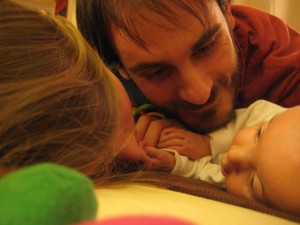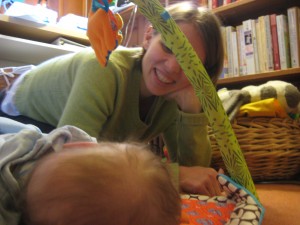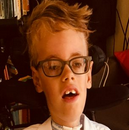More thoughts on doctors, parents, and the future (Jan. 28)
Lucas has continued to have daily spit-up episodes so we’re heading to the pediatrician’s tomorrow morning. We’d like to think that he’s just being a baby – baby’s puke, after all – but he’s also been lethargic the last couple of days and though he hasn’t spiked a fever, repeated vomiting is especially scary for Lucas because of the possibility of aspiration. In fact, the other day some of the breast milk he spit up found its way into his lungs and we had a bit of a scare… we don’t want to take any more chances and thus we’re off to the docs.
With Lucas sleeping a lot the last few days we’ve had time to think more about the future. On Tuesday night we watched “Lorenzo’s Oil”, an early 90s movie about a young boy with a terminal illness staring Susan Sarandan and Nick Nolte (the latter sporting a bad Italian accent). Watching Hollywood dramas about special needs children may not be the best idea when your own baby is struggling with health issues, but in this case the movie gave us a lot to think about. It’s based on the story of Lorenzo Odone, who was diagnosed with a genetic disease called Adrenoleukodystrophy (or ADL) when he was 5, and his parents who search desperately for a treatment despite doctors, foundations and other parents basically telling them to just let him die. Their research leads them to create a special oil that helps counteract the symptoms of the disease (ADL essentially causes a deficiency of long-chain fatty acids which in turn leads to deterioration of the brain). In real life Lorenzo survived for 25 years; no ADL patient had previously lived more than 3 years after being diagnosed.
 So it’s an inspiring story, and it inevitably got us thinking about Lucas, not just because ADL was among the many genetic diseases he tested negative for in the hospital. One of the great things about the story is the way in which the parents are empowered, not because of but despite the medical industry. Not all the doctors are bad – one in particular becomes a major ally in their search for an unconventional treatment – but in most cases doctors base their recommendations and prescriptions on statistics instead of a child’s particular set of circumstances, proving themselves to be cogs in a system corrupted by money and often determined to maintain the status quo. It takes some real courage and creativity to challenge that system, and the parents of Lorenzo Odone certainly had a lot of both, leading to fantastic results.
So it’s an inspiring story, and it inevitably got us thinking about Lucas, not just because ADL was among the many genetic diseases he tested negative for in the hospital. One of the great things about the story is the way in which the parents are empowered, not because of but despite the medical industry. Not all the doctors are bad – one in particular becomes a major ally in their search for an unconventional treatment – but in most cases doctors base their recommendations and prescriptions on statistics instead of a child’s particular set of circumstances, proving themselves to be cogs in a system corrupted by money and often determined to maintain the status quo. It takes some real courage and creativity to challenge that system, and the parents of Lorenzo Odone certainly had a lot of both, leading to fantastic results.
The movie also got us thinking again about diagnoses. On the one hand we’re very thankful that Lucas hasn’t tested positive for any disorder like ADL; on the other, being undiagnosed limits what we can do as parents to help Lucas. Whereas the couple in the movie pours through text books and journal articles about ADL, educating themselves enough about human biology to come up with a rather miraculous solution, we’re left googling symptoms like “hypotonia” and broad concepts like “brain injury”. In a way the film helped us understand why doctors tried so hard to diagnose the underlying condition which caused Lucas’s premature birth, breathing problems, and low muscle tone. And who knows: next week we’re off to the brain injury clinic and we just might hear some thoughtful insight on Lucas’s progress from the neurologists. Then again, we might get more speculation, generalization and presumption about the possible effect of bleeding on Lucas’s brain. 
Speaking of brain injury, we’ve been reading a fascinating book lately titled “What To Do About Your Brain Injured Child” written by a guy named Glenn Doman who started the Institutes for the Achievement of Human Potential after decades of working with children who had brain injuries. We found out about the Institutes (located in Philadelphia) and the book from our friend Evan and we may actually go there at some point to check out a seminar or two. Though the book is somewhat dated having been written in the 60s, it tells an amazing story of how a group of therapists and doctors came to understand and treat children with brain injuries. The neuroscience is actually fairly easy to understand, and we appreciate some of the broader implications, such as techniques they come up with to help brain-injured children go through the various stages of development. We also enjoyed the hyperbole on the back of the book which coincides with some of our thoughts above about “Lorenzo’s Oil”: “It is the parents who have accomplished the miracles… Parents, those commonly ignored, sometimes despised, frequently patronized, almost never believed people, will have done at home all of the treatment which brought a child from despair to hope, from paralysis to walking… etc.”
A little over the top, but the idea that we can make a difference has us doing all we can to learn about Lucas’s challenges – from the huge selection of child development and special needs kids books on our bookshelf, to grilling every professional we meet, to Krista recently starting an anatomy and physiology class at UDC. We’re not going to take too much credit for any progress (yet) and we won’t be getting an honorary PhD like the father of Lorenzo Odone, but for now we’re doing our best: learning about Lucas’s special set up circumstances, taking in many different opinions and ideas about how to best care for him, and coming up with a plan for the (unpredictable) future.
PS: We’re sitting down tonight to watch part of “Howard Zinn: You Can’t be Neutral on a Moving Train”, the documentary about the great historian who died yesterday at the age of 87. He was committed to making history serve people and social movements and we, like millions of others, learned so much from him. We plan on reading Lucas the “People’s History of the United States of America” from start to finish…


Comments (3)
Ann
January 29th, 2010 at 11:40 pm
Hi,
I came to your blog from the Tracheostomy.com message board. Your experience sounds so much like mine with my son Jack so many years ago. It’s hard no knowing, especially when you are a planner and a do-er – which it appears you are. Your son is beautiful and I hope you can find some answers and he finds his way off the vent. I’m curious if you’ve had a muscle biopsy done yet? My son’s first muscle biopsy (back in 1999) didn’t give us any answers, but a repeat biopsy six years later gave us the answer we were looking (but don’t really like :)
Best,
Ann
Nadine Dutcher
January 29th, 2010 at 1:23 pm
Krista and Burke, Small world department. Agosto Odone, Lorenzo’s father, was my student when we were both at the World Bank. He was a tourism specialist and I was a writing teacher. I knew him way before the Lorenzo saga, even before he married Lorenzo’s mother, his second wife. I haven’t seen him in years but have admired his and his wife’s courage from afar.
I like and admire your determination.
Nadine
sammie & Dan
January 28th, 2010 at 11:07 pm
I’ve heard too many stories of “consumers” of medicine who just wouldn’t take “no” or “hmmm??” for an answer and made progress! Go for it!
Leave a reply